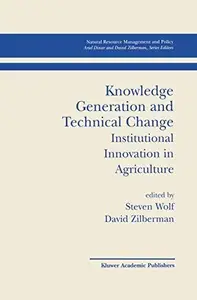- Témaindító
- #1
- Csatlakozás
- 2024.09.10.
- Üzenetek
- 43,663
- Reakció pontszám
- 8
- Díjak
- 5
- Kor
- 37

Free Download Knowledge Generation and Technical Change: Institutional Innovation in Agriculture By Henry Etzkowitz (auth.), Steven A. Wolf, David Zilberman (eds.)
2001 | 371 Pages | ISBN: 1461355842 | PDF | 15 MB
Knowledge generation and transfer mechanisms are being transformed in important and controversial ways. Investment in research and development has increased in response to recognition that scientific productivity is tightly connected to economic dynamism. Patent protection has been expanded in order to stimulate higher levels of private investment. Intellectual property rights held by public organizations and researchers are now increasingly transferred to private organizations to accelerate the diffusion and enhance the value of knowledge produced by public agencies and universities. Additionally, new institutions such as university offices of technology transfer, venture capital markets, and a variety of consortia in knowledge-intensive industries are being established throughout the United States and in other parts of the world. These changes have led to a repositioning of the state in systems of innovation and an increase in the proprietary character of technical information. The purpose of this book is to review and analyze i) contemporary transitions in agricultural knowledge generation and extension arrangements from an empirical perspective, and ii) emerging and contradictory perspectives as to how knowledge systems can be assessed effectively. The authors aim to provide the reader with a better understanding of the implications of new biotechnologies and new intellectual property rights regimes on public-private relations in science, the extent to which benefits from scientific knowledge are being appropriated by private sector actors, the diversity and possible outcomes of privatization initiatives in extension, and prospects for public goods production and ecological sustainability given contemporary trends. The book presents contrasting views on the degree of complementarity and substitution between private and public sector investments in research and extension. Recognizing that the labels `public' and `private' are incomplete and at times misleading descriptions of the structure and function of coordinating bodies in social systems, the analyses highlight ways in which public and private spaces and modes of functioning combine. In addition to illustrating a broad range of analytic methodologies useful for studying organizational questions in knowledge systems, the authors identify the implications of a range of past and potential institutional innovations.
Buy Premium From My Links To Get Resumable Support,Max Speed & Support Me
Code:
⚠
A kód megtekintéséhez jelentkezz be.
Please log in to view the code.
